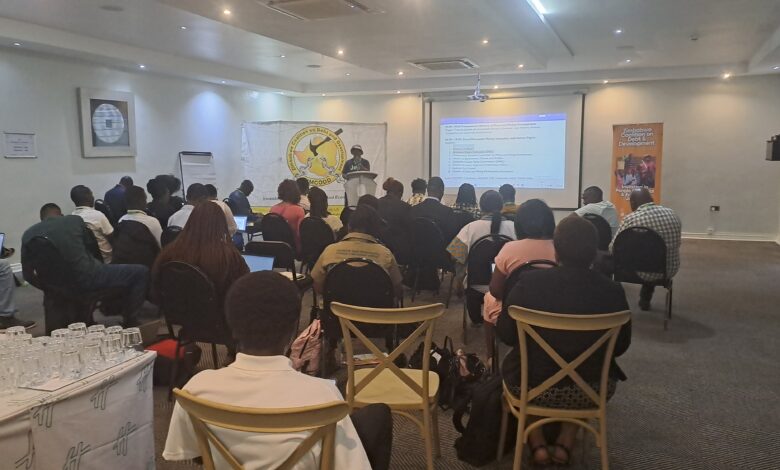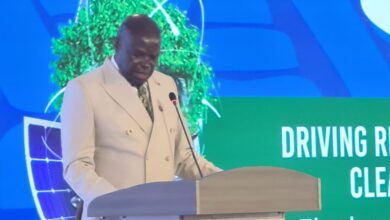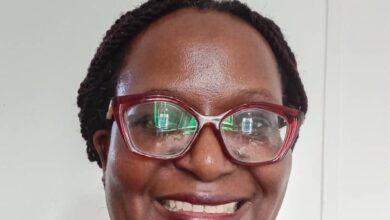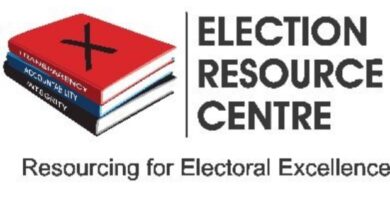Stakeholders Call for Stronger Oversight, Equity and Sustainable Practices in Zimbabwe’s Mining Sector

Loraine Phiri
Various stakeholders yesterday highlighted the human impact of extractivism on Zimbabwe’s mining communities and underscored the need for stronger oversight as well as equitable and sustainable practices in the country’s mining sector.
The calls were made during a side session of the Zimbabwe Alternative Mining Indaba 2025, held at Holiday Inn Bulawayo under the theme “Business, Inequality and Human Rights.” The session was hosted by the Zimbabwe Coalition on Debt and Development (ZIMCODD) in partnership with the Publish What You Pay Coalition.
Speakers from civil society organisations, churches, and mining-affected communities discussed challenges of inequality, human rights violations, and environmental degradation in mining areas.
Economic Justice for Women Project (EJWP) executive director Margaret Mutsamvi highlighted human rights violations and deepening gender inequality in lithium mining communities.“People fear speaking out against mining company violations. Heavy security further intimidates them. Working conditions are poor, yet communities remain silent out of desperation because mining is their source of livelihood,” she said.
Mutsamvi added that child marriages are increasing in mining areas, while women are often overlooked for jobs.
“There are a lot of child marriages in the mining communities. Women face job discrimination and are often excluded from roles deemed masculine in the mining sector. This makes them vulnerable to sextortion in order to gain employment. There are also issues of water contamination, which disproportionately affect women who must walk long distances to fetch water, exposing them to abuse,” she said.
In Matabeleland, Themba Chivheya said some mining companies operate without consulting local leaders, creating tensions. In Matabeleland, some mining communities and leaders wake up to miners already on the ground. This undermines local authority and breeds conflict,” he said. Chivheya also highlighted cultural beliefs that disadvantage women in mining ventures, such as the notion that “menstruation chases away money in the mines,” which perpetuates gender inequalities and harassment.
ZIMCODD Southern Region Board Member Malvern Daka raised concerns about health risks in the Hwange mining community, including respiratory diseases, and shared pictures of a child who suffered burns linked to mining activities. He expressed frustration over unsuccessful efforts to engage both mining companies and Parliament.
“Efforts to engage mining companies through letters have been fruitless. We petitioned Parliament to place Hwange under a single local authority, but the concession area issue persists,” he said. “About 40,000 people who live in the concession area do not have a voice. A Parliamentary Portfolio Committee came and engaged us, but after all deliberations, they remained silent.Since 2015, no significant response has been received.”
He added: “An eight-year-old child was burnt by subsurface fires, and five boys have died from respiratory illnesses. There is a fear of pneumoconiosis among workers and communities because of hazardous mining activities.”
Fight Inequality Alliance Zimbabwe Council member, Yollander Millin highlighted the clash between mineral rights and land rights, compounded by poor coordination and weak accountability systems.“Communities are often unsure where to raise their concerns and get tossed around,” she said, calling for clearer engagement mechanisms.
In response, Hon. Edwin Mushoriwa, Member of Parliament for Dzivaresekwa, stressed the need for stronger parliamentary oversight to curb exploitation in the mining sector and ensure equitable distribution of mineral wealth. He urged communities to actively engage their elected representatives. “When did you last discuss a particular developmental issue with your councilor or MP?” he asked.
“Government processes are generally slow. If you submit a petition to the Parliamentary Portfolio Committee on Mines and Mining Development and they come to assess your complaint, they will table the petition in the House, and the report will follow. However, you need to be proactive, follow up with them, and notify your MPs so that they push for the matter to be debated.”
Hon Mushoriwa commended civil society groups such as ZIMCODD for capacitating legislators on issues of debt and mining, noting a noticeable shift in MPs’ engagement on such issues in Parliament He also encouraged communities and CSOs to share pictures and alert MPs of problems, particularly before national budgets.
Professor Favourate Sebele unpacked the gendered dimensions of tax injustice in the mining economy, linking illicit financial flows, corruption, and weak enforcement to “billions drained from the treasury with disproportionate impacts on women and girls.”
She noted that the arrival of mining operations often leads to an influx of men, triggering social risks such as prostitution, sexual assault, child marriages, and the spread of sexually transmitted infections. Women also shoulder the burden of unpaid care work as they fetch water, care for the sick, and lose income-generating time.
Professor Sebele proposed strategies for integrating feminist fiscal policies into the 2026 national budget and the National Development Strategy 2 framework. These include investing in women’s associations to enhance decision-making and participation, advocating for gender-sensitive budgets, ensuring fair labour practices, using the Auditor General’s report on local authorities as a tool to address financial mismanagement, and advocating for the publication of gender-responsive data from mining companies. She also suggested advocating for stronger corporate social responsibility and consistent policies to hold violators accountable.





